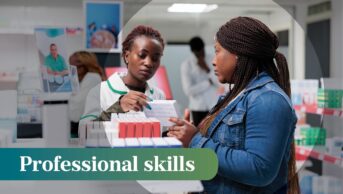
Unseen Studio/Unsplash.com
After reading this article, you should be able to:
- Understand how to effectively prepare for the Oriel assessments;
- Conceptualise personal experiences and examples that demonstrate and reflect the attributes detailed in the Professional Attributes Framework;
- Anticipate what to expect on assessment day;
- Understand how to access further resources to continue self-directed learning.
Introduction
The Oriel process can be a nerve-wracking experience. The foundation training year is directly connected to your performance in the Oriel exams: the better you perform in Oriel, the higher you rank in the country, increasing your chances of securing your first-choice trainee pharmacist placement.
However, succeeding in Oriel requires you to reflect on the purpose of the assessment and evaluate what the process is designed to measure. Understanding the rationale behind the assessment and developing an ability to break down the questions to identify strategic words and phrases will help you perform to your full potential, giving you the confidence you need to succeed on the day.
This article provides a starting point for MPharm students beginning their preparation for the Oriel assessments. Based on the recent experience of an ex-Oriel interviewee, it provides a series of tips to help you prepare effectively, with suggestions made on where to go next for further support prior to the assessment. The Pharmaceutical Journal has also published other useful articles that can be used to familiarise yourself with the Oriel assessments:
- Oriel situational judgement test: what pharmacy students need to know;
- Oriel numeracy test: what pharmacy students need to know;
- How to tackle the Oriel numeracy assessment.
Tip 1: Focus on patient safety
Patient safety is at the core of healthcare; all healthcare professionals have a duty to ensure patients do not come to harm and receive safe, high-quality care.
In the first part of the Oriel situational judgement tests (SJTs), you will be given a scenario and five responses. Scenarios may include dealing with a difficult patient, problem solving or working effectively within a team. After reading the scenario and the available responses, you will be asked to arrange them in order of most appropriate to least appropriate. The second part of the SJTs involves a scenario with eight potential responses, asking you to select the three most appropriate. More information on the SJTs can be found in this article: ‘Oriel situational judgement test: what pharmacy students needs to know’.
Many previous Oriel candidates describe there typically being an obvious worst answer — this could include ignoring or refusing to help a patient or colleague, or acting outside of the GPhC principles. In turn, candidates also report a fairly obvious best answer — for example, reporting cheating in an exam or going above and beyond for a patient. With five, often similar, responses remaining, it can be daunting to know how to rank them as most appropriate. However, by analysing each option in the context of patient safety, you can start to evaluate answers effectively. For example, arguing with colleagues and dealing with conflict in an inappropriate manner may lead to a reduction in the standard of care provided to a patient. Similarly, ensuring that essential medicines are supplied in a timely manner and identifying colleagues who may be deemed not fit to work can reduce the risk of diminished patient safety.
Learning point
Patient safety is always the top priority, regardless of the scenario. Consider all the available options in response to the scenario, and identify which responses may compromise patient safety, and which responses support patient safety.
The following PJ resources demonstrate person-centred approaches being applied to areas of pharmacy practice and may be useful background reading:
Tip 2: Use the Professional Attributes Framework
The SJT questions will be assessing specific attributes that you should demonstrate as a pharmacy professional and future trainee pharmacist. These attributes are described in the Professional Attributes Framework, which will be your central reference for the Oriel assessments[1]. For the SJTs, only four attributes are assessed:
- Person-centred care;
- Multi-professional working and leadership;
- Professional integrity and ethics;
- Problem solving, clinical analysis and decision making.
Additionally, providing ‘person-centered care’ is the first of nine standards demanded of the pharmacy profession in the General Pharmaceutical Council’s (GPhC’s) standards for pharmacy professionals[2]. When pharmacy professionals can identify and understand the patient’s values and what is important to that individual, and make big or small changes to the care provided in response, person-centered care is demonstrated. The PAF breaks down each attribute further into behavioural indicators that demonstrate the attribute. For example, professional integrity and ethics is demonstrated by behaviours such as honesty and trustworthiness, including being open and honest when mistakes have been made.
Personal reflection
In the months leading up to the Oriel assessment, I made a list of all previous experiences that demonstrated my competence in line with the Professional Attributes Framework (PAF).
Many situations I had experienced covered more than one assessed attribute. You do not have to recall a separate experience for each single attribute in the PAF. Many experiences can be used in response to a variety of questions. For example, helping a patient above and beyond could fall under ‘person-centred care’ and ‘resilience and adaptability’.
Previous examples you may have experienced could include:
- Working in a team — respecting the roles of everyone in a team and demonstrating a willingness to learn exhibits a good team-working ethic.
- Dealing with conflict — effective communication and conflict resolution is a desired skill for working in any workplace and team, and is not specific to healthcare or pharmacy. For instance, many jobs with a customer service element or direct engagement with the public will require skills that are easily transferred to a healthcare context.
Learning point
Download the PAF and use the attributes and behavioural indicators listed to guide your study and preparation.
Tip 3: Gain work experience
Students who have had some form of practical experience in the pharmacy world, whether it be a part-time job or previous work experience in a pharmacy, can sometimes be at an advantage in the Oriel assessments, owing to their exposure to real-life pharmacy scenarios and interactions. During your MPharm degree, it is likely you have been sent out on day placements to community and hospital pharmacies, but you are also free to find your own placements in addition to these. This includes sectors that you may not be able to access through your university (e.g. industrial placements, specialisms or specific settings that you are most interested in). You may also be able to secure paid work or a part-time job that will provide you with access to real-world situations that the Oriel assessments will test you on. Having a senior member of staff present to shadow your performance and provide feedback during placements and work experience will help you to understand the right and wrong things to do, as well as identify the small details that may help you distinguish between two similar responses in the SJT scenarios.
Learning point
Practical experience in a pharmacy setting, such as industry, community, hospital or general practice, will provide authentic exposure to the types of scenarios that feature in the SJTs.
Tip 4: Prepare, prepare, prepare!
Oriel assessments are designed to be challenging and unlike the exams you may have been successful in during your prior academic career. The Oriel process is calibrated to ascertain your baseline competence in pharmacy practice and your ability to appropriately deal with difficult and uncertain situations.
It is natural for all interviews and exams to trigger a certain degree of stress and anxiety. In some circumstances, this can affect cognitive performance, where our brains may let us down and ‘go blank’. The best way to combat this is to ensure you have prepared as much as possible and understand the reasoning behind certain scenarios and the underpinning rationale for the Oriel assessments.
Personal reflection
I had four to five years of community pharmacy experience before my Oriel assessments; however, when I completed some practice SJT questions, after initially feeling like I had answered well, my score came out lower than I expected. On reflection, I was able to see that my approach to judging situations and imagining how I would act were not always the most appropriate. After reviewing the answers in partnership with the PAF attributes, I came to understand the rationale behind the mark scheme and began to adjust my answers moving forward. I was very glad to have gone through some practice scenarios before the exam, otherwise I would have lost points unnecessarily.
In addition to the SJTs, you will also be required to complete a numeracy exam. This consists of 10 questions in 20 minutes and covers basic pharmaceutical calculations. It is important to note that not all areas of pharmaceutical calculations are included in the numeracy test; therefore, you must tailor your revision to your weaker areas accordingly, ensuring you do not practice calculations for non-assessed topics (e.g. displacement values).
These videos on how to answer common calculation types, produced by The Pharmaceutical Journal, may be useful:
- Medication maths: how to solve dose and dosage calculations
- Medication maths: how to solve infusion calculations
- Medication maths: quantities to supply and using provided formulae calculations
- Medication maths: how to solve pharmacy calculations — concentrations, dilutions and health economics
Learning point
Spend the summer break preparing for your Oriel assessments — do not leave it too late and rush your preparation. Allowing adequate time to practice answers and build your confidence and familiarity with the process is an essential component to succeeding in Oriel.
Tip 5: Think like a trainee, not a pharmacist
Although your responsibility will increase as a trainee pharmacist, there are some things that you will not be able to do. There are also some things a fully trained pharmacist cannot and should not do; for example, discharging a patient is not the job of a hospital pharmacist, whether the patient wants to leave or not — this is the role of the medical team responsible for the patient’s care. The Oriel SJTs present scenarios for you to answer as a trainee pharmacist. Recognising your own professional limitations is vital, as well as being able to refer onward and seek senior support where appropriate. You can jeopardise your career, as well as patient safety, if you act outside of your legal or professional boundaries.
Learning point
Speak to your pharmacy practice lecturers about your expected responsibilities as a trainee pharmacist and know where to draw the line between competence and expectation.
Tip 6: Review and adapt online situational judgement test examples
There are hundreds of resources online for other medical professionals, including doctors and dentists, who have to undertake their own Oriel-style interviewing and ranking. Searching online will present a vast range of scenarios and practice questions created to help other healthcare professionals prepare for their respected assessment. Practice scenarios written for other healthcare professions can still be valuable and provide insight into how certain scenarios involving patients might be approached. Although different professions have different assessment criteria, the core values of healthcare are universal — patient safety is the priority, patients and colleagues should all be treated as equal without judgement, and all members of the team should work collectively for the benefit of the patient.
Health Education England has also published some example SJT questions that are helpful to work through and understand the rationale behind certain marking schemes[3].
Learning point
As well as pharmacy specific books and resources, you can also make good use of online materials produced for other healthcare professionals and adjust them to pharmacy[4].
Conclusion
The Oriel process is an important milestone in your journey to becoming a fully qualified pharmacist in the UK. If you have reached your third or fourth year of university, your clinical knowledge will be well developed, and there will be other methods in place to assess your clinical ability. However, knowledge of medicines and pharmacology alone does not make you a good pharmacist. For this, you will require the attributes articulated by the GPhC, which include respect, effective communication skills, professional integrity and a strong ethical compass. Oriel can be thought of as analogous to a sieve — it separates the prepared from the unprepared, the competent from the incompetent and the professional from the unprofessional. By avoiding inadequate preparation and using your time effectively, your chances of success will be improved, allowing you to benefit from a preregistration placement that will enable you to demonstrate your full potential as a trainee pharmacist.
RPS Oriel programme
Third-year MPharm students can join the RPS Oriel programme.
Delivered in collaboration with NHS England, NHS Education for Scotland, Health Education and Improvement Wales and The British Pharmaceutical Students’ Association, this programme provides useful guidance and tips when going through the Oriel recruitment process. It also includes an Oriel workshop and full mock assessment, to enable students to effectively prepare for the Oriel assessment.
Find out more information and register at: https://www.rpharms.com/development/students/national-pharmacist-foundation-training-recruitment/oriel
- 1Foundation Trainee Pharmacist Professional Attributes Framework. Health Education England. 2016.https://www.lasepharmacy.hee.nhs.uk/dyn/_assets/_folder4/_folder4/national-recruitment/PreregistrationPharmacistProfessionalAttributesFramework.pdf (accessed May 2023).
- 2Standards for pharmacy professionals. General Pharmaceutical Council. 2017.https://www.pharmacyregulation.org/sites/default/files/standards_for_pharmacy_professionals_may_2017.pdf (accessed May 2023).
- 3National Foundation Trainee Pharmacist Recruitment. Health Education England. 2023.https://www.lasepharmacy.hee.nhs.uk/national-recruitment/ (accessed May 2023).
- 4Youles D. The Art of Acing Oriel. London: : Self-published 2022.


